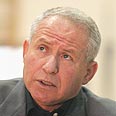
Security voice: Dichter
צילום: אלי אלגרט
Election Day referendum
March 28 will be a referendum on unilateral disengagement
The upcoming elections are a referendum about future unilateral disengagements. Avi Dichter's admission earlier this week leaves no room for doubt: If we cannot reach a peace agreement with the Palestinian government (i.e. Hamas), we will be left with no choice but to continue the process of civilian, not military, disengagement.
A future pullout will look something like the pullout from the northern West Bank – a dismantling of civilian towns and continued military control of the area.
It is no coincidence that it took the former head of the Shin Bet to utter these ideas. His words are meant to head off attacks from the right that unilateral disengagement endangers the nation's security.
There is also no question that his words were coordinated with the acting prime minister. After all, it is Kadima's diplomatic platform, and it is the only platform it has to present to the public. The party has no economic or social platform. It is a one-issue party, nothing more.
No more veto
The right-wing and the settlers understand this full well. Indeed, this is exactly what they are afraid of. For the first time in years, there is a strong majority in the Knesset to support such a move.
Until now, they could rely on a bloc vote, led by the Likud, to veto such a move and block a withdrawal from Judea and Samaria.
But this bloc crumbled during the unilateral pullout from Gaza, and it now appears a majority of Israelis will use this election to approve further withdrawals in the West Bank.
No referendum
At the moment, it appears that the right will win no more than 50 seats in the Knesset, and could even gain a bit between now and March 28. What's not so sure is that it will be possible to get the ultra-Orthodox Agudat Yisrael or Israel Our Home parties to support a second disengagement.
This understanding of the situation led Yesha Council leader Pinchas Wallerstein to declare several days ago that this election should not be considered a national referendum on disengagement.
He mentioned Ariel Sharon's promise that there would be no more unilateral withdrawals; therefore, any decision to dismantle settlements would require such a referendum.
It would appear that the settler leadership once again has failed to read the situation correctly. Anyone believing it will be possible to call for a referendum following this election simply has no understanding of reality.
Left-wing fantasy
If remarks by Meretz candidate Zahava Gal-On are anything to go by, politicians on the left, too, fail to correctly read the situation.
Gal-On's reservations about unilateral disengagement from large sections of the West Bank, in hopes that it is possible to reach a peace agreement with the Palestinian Authority. This means remaining in all the territory.
But it is clear that such an agreement will not eventuate with a Hamas government that has no intention of bending on several main points of contention: Israeli withdrawal to the 1967 borders, including Jerusalem, and a right of return for Palestinian refugees.
Anyone waiting for a full-blown peace agreement will be waiting a long time, and is playing directly into the hands of the settlers.
Beilin wakes up
Yossi Beilin opposed the Gaza withdrawal, until he came to his senses and supported the move. He, too, understood that opposing Sharon's move meant staying in Gush Katif.
The coming elections are indeed a national referendum on further unilateral withdrawals. Of course, it would be vastly preferable to withdraw via an agreement with the Palestinians, but if such a deal is unattainable, we have no choice but to establish, together with the United States, our new borders.
These will not guarantee peace, but will give Israel enough security, and will guarantee enough territorial contiguity for the Palestinian state that will be created de facto.
Shmuel Shenhar is a lawyer










